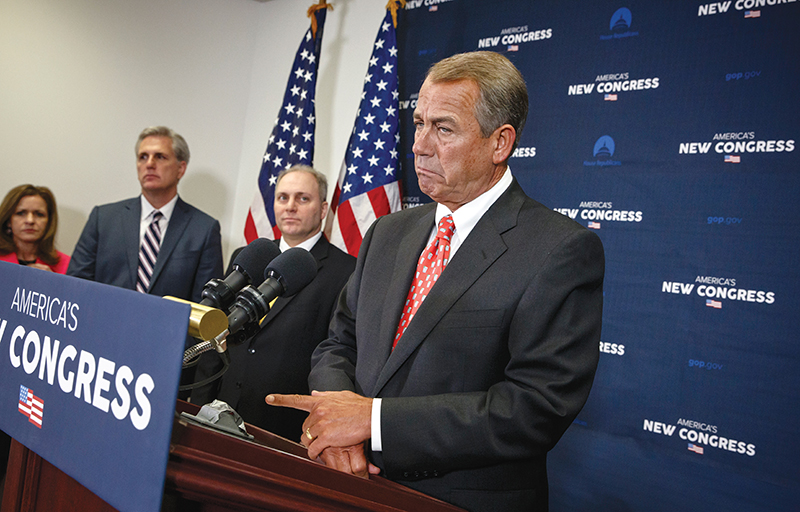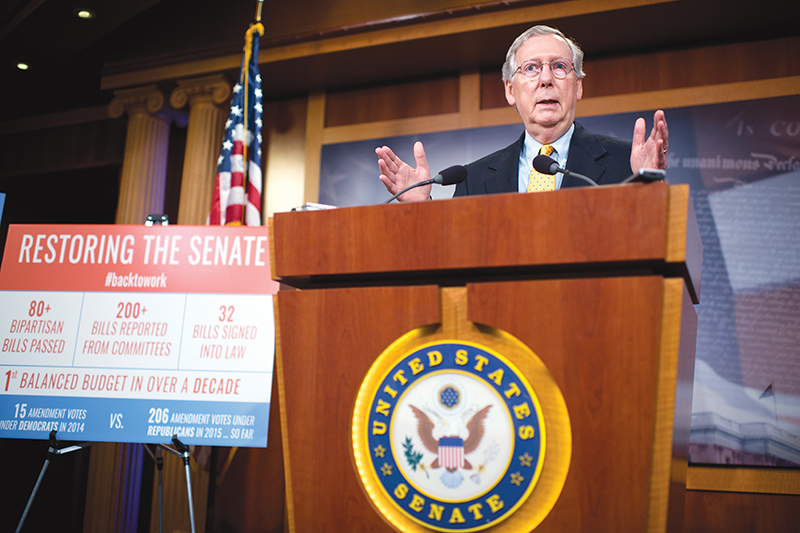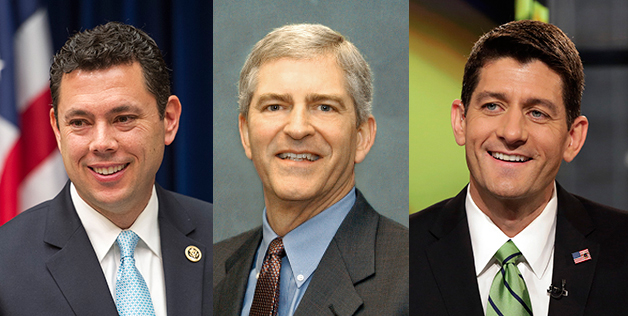The Tea Party is dead. Long live the Tea Party.
After the 2014 midterm elections, conventional wisdom held that the grassroots conservative activist fervor that gripped the Republican Party during President Obama’s first term had dissipated. Republicans won control of the Senate after incumbents and many leadership-backed candidates defeated more conservative primary challengers. It was a victory for the dreaded party establishment.
Eight of 12 Republican incumbents running for re-election to the Senate that year drew Tea Party challengers, including Republican Leader Mitch McConnell of Kentucky and longtime Mississippi Sen. Thad Cochran, both in conservatives states. All eight incumbents won. “The Tea Party, the popular political movement that grew from widespread public concern over the growth of government, died on Tuesday,” wrote one columnist, referring to the day of one of those primaries.
Related Story: http://www.washingtonexaminer.com/article/2574118/
That was before disaffected conservatives helped topple House Speaker John Boehner last month and then denied House Majority Leader Kevin McCarthy the votes to succeed him this month, forcing the California Republican to withdraw his name from consideration. Combined with Dave Brat’s upset victory over then-House Majority Leader Eric Cantor in a Virginia Republican primary last year, this month’s action brought the number of House leaders ousted by Tea Partiers to three — three big ones.
And they might not be done yet, judging from their intense scrutiny of potential Boehner replacements, some of them former conservative movement favorites in their own right.
The premature Tea Party obituaries also predate Donald Trump’s stubborn dominance in polls of Republican presidential primary voters, running consciously as an anti-establishment political neophyte. “I love the Tea Party, I do,” Trump has declared. “I’ll tell you about the Tea Party, these are people, in all fairness, these are people that love this country.”

Disaffected conservatives helped topple House Speaker John Boehner last month and then denied House Majority Leader Kevin McCarthy the votes to succeed him this month. (AP photo)
House backbenchers who owe their careers to the Tea Party movement brought down a seemingly secure speaker and forced out a successor who appeared to have majority support. They also expressed incredulity that instead of installing their preferred candidate, Florida Rep. Daniel Webster, R-Fla., leadership delayed the speaker’s election.
“We had two candidates … and they called off the election because they didn’t like the result,” is how Rep. Thomas Massie, R-Ky., put it. “What’s this tell the American people? It looks like a banana republic.” Yet McCarthy’s problem didn’t appear to be having enough votes within the caucus, but rather the fear that too many conservatives would defect on the House floor.
The issue is not that the Tea Party is now the GOP or has majority support within it, it’s that it has sufficient support to make the party nearly ungovernable on Capitol Hill.
How did this happen? Even when conservative insurgents were losing Republican primaries a year ago, it didn’t tell the whole story. Consider the case of Thom Tillis, the Republican who was elected to the Senate from North Carolina after beating a Democratic incumbent. First, he had to defeat a conservative primary opponent named Greg Brannon.
“[I]f Tillis represented the Republican establishment, which is something he denies, of course; it is not a label anyone embraces, he also represents the party’s new, post-Tea Party mainstream,” wrote the Atlantic’s Molly Ball, listing his conservative endorsements and the policies described as a “conservative revolution” when Tillis was North Carolina’s House Speaker during a period of Republican dominance unseen in the state since 1896.
The observation that conservatives had moved the party establishment to the right was correct, but what wasn’t true was Ball’s conclusion: “If this race is any indication, the ‘Republican civil war’ storyline so beloved of pundits in recent years may have to be retired.” The truth, made glaringly apparent since Congress returned after the summer recess, is that the Republican civil war is instead raging as never before.
Why? Because many conservatives feel Republicans get elected by making promises they don’t keep. Those promises are on issues such as the size of government, abortion, border security, the family and religion in the public square, and the fight against various liberal programs. Once Republicans are in office, they say that implementing their conservative agenda items is impractical or can be done only by rewarding the GOP with more election victories and bigger majorities.

Senate Majority Leader Mitch McConnell reaffirmed his support for repealing Obamacare through the reconciliation process as late as this summer. (AP photo)
During the 2014 campaign, conservatives were regularly told that McConnell had a secret plan to repeal Obamacare. “Figure out how to repeal this through reconciliation,” he was quoted as telling his aides over a year before the election. “I want to do this.” McConnell had previously said, “If I’m the leader of the majority next year, I commit to the American people that the repeal of Obamacare will be job number one.”
But before voters even went to the polls, he began to add caveats. “It would take 60 votes in the Senate,” McConnell said of Obamacare repeal in an interview with Fox News’ Neil Cavuto. “No one thinks we’re going to have 60 Republicans, and it would take a Republican signature.” After an election some conservatives viewed as a referendum on Obamacare, McConnell told reporters he didn’t want to encourage unrealistic “expectations about what may actually become law with Obama — of Obamacare — in office.”
McConnell reaffirmed his support for repealing Obamacare through the reconciliation process as late as this summer, a maneuver that would avoid the 60-vote threshold for breaking a filibuster. He said he would work to “fulfill the promise we made to our constituents.” But this time it was framed as more of a model of what could happen if a Republican president was sworn into office.
Some conservative groups supported the tactic. Heritage Action, for example, described it as a “trial run” for a Republican presidency and said it would “reaffirm the Republican-controlled Congress’ commitment to sending a bill repealing Obamacare to the president’s desk in 2017, when it will hopefully be signed into law.”
Many rank-and-file conservatives didn’t see it that way. Campaign documents such as the congressional GOP’s 2010 Pledge to America didn’t merely promise to wait for the election of a Republican president. A representative letter to the editor of the Des Moines Register, the newspaper of record in the home of the first 2016 presidential caucuses, complained that both Obamacare and the president’s decision not to deport millions of illegal immigrants remained in place.
“Both John Boehner and Mitch McConnell lied to the American people, betrayed Republican voters, and helped Democrats fund both Obama priorities,” the Altoona, Iowa, reader concluded. “Our Republican congressmen and senators need to vote for their removal from leadership positions.”
These complaints aren’t new. In his 1975 post-Nixon book, Conservative Votes, Liberal Victories, Pat Buchanan wrote, “We should not be afraid of confrontation in politics,” directing this admonition at fellow Republicans rather than at Democrats. At first, exasperated conservatives blamed the remaining centrist and liberal Republicans for unfulfilled campaign promises. “Let Reagan be Reagan!” they exclaimed of aides to the 40th president who weren’t true believers.
But little by little, some came to sense something nefarious was happening. “Let’s give someone else a chance to be Reagan,” grumbled a conservative columnist, adding Reagan “obviously doesn’t know how to do it.”

The Tea Party has sufficient support to make the GOP nearly ungovernable on Capitol Hill. (AP photo)
Anti-Reagan sentiment on the Right was largely confined to the fringes. But in the 1990s, George H.W. Bush faced a conservative revolt over his broken promise — “read my lips” — not to raise taxes. House conservatives tried to oust Newt Gingrich, the man behind the “Republican revolution” that gave the party its first lower chamber majority in 40 years.
Such sentiment was muted for most of George W. Bush’s presidency, only to come back with a vengeance later in his second term with fights over his nomination of Harriet Miers to the Supreme Court, amnesty for illegal immigrants, the Wall Street bailout and recriminations over spending increases throughout his administration. Opposition to bailouts was one of the rallying cries of the early Tea Party, suggesting an implicit repudiation of Bush to go along with unmistakable opposition to Obama.
Now, the rage is no longer limited to conservative voters, activists and organizers. It wasn’t some sign-waving Tea Party protester who called McConnell a liar this summer, it was Sen. Ted Cruz, R-Texas, on the Senate floor. The average House conservative can list what they see as the broken promises as easily as any blogger: Obamacare, the Export-Import Bank, executive amnesty, Planned Parenthood funding and the trade promotion authority that some of them call “Obamatrade.”
Although individual senators have more power to gum up the works, the House ended up being the chamber in which the Tea Party came to a boil. A relatively small faction of committed conservatives realized it had the votes to deny floor majorities to bills and legislative maneuvers favored by leadership. Once Boehner had to start relying on Democrats and only a minority of Republicans to get to 218 votes, his position became untenable.
Both major parties were once coalitions of moderates, held together by leadership and perks, but they have since sorted ideologically. The Democratic Party is now almost uniformly liberal, the Republican Party conservative. Paradoxically, as the GOP has become more homogenous it has, at the congressional level at least, found it more difficult to function as a traditional political party.
Some Republicans, even fairly conservative ones, think this has gone too far. They say this movement has resulted in increasingly unforgiving ideological litmus tests and evolving standards of who is a true conservative as opposed to a “RINO,” or Republican In Name Only. These critics point to prominent radio talk show hosts praising Paul Ryan as a great conservative in 2012 and then excoriating him as a border-obliterating sellout, or to primary challenges against incumbents with American Conservative Union ratings in excess of 80 percent.
Maybe this would make sense if the result was increasingly conservative governance, the Tea Party skeptics say, but they suggest it mainly breeds division, dysfunction and government shutdowns for which Republicans have been blamed regardless of the circumstances for more than 20 years.

As the Tea Party has gone mainstream, its Republican critics argue it is behaving more like the establishment. (AP photo)
“There are very few ‘Rockefeller Republicans’ left,” maintains Matt Lewis, author of the forthcoming book Too Dumb To Fail, which argues conservatives have dangerously lowered their intellectual standards. “Today’s divide is mostly about conservatives who believe in governing versus those who don’t.”
Part of the problem is that even though Republicans promised conservatives they would do a lot with their new majorities, there really were structural limits to what they could accomplish without the White House, especially in a political culture in which the presidency dominates. “This House majority cannot, like the Obama administration, blow off steam by issuing executive orders or sending marching orders to various parts of the executive branch,” wrote columnist Michael Brendan Dougherty in The Week. This causes tactical disagreements to take on inflated importance and ultimately to become unresolvable, since neither side really makes a convincing argument that their tactics will produce any tangible results.
The Cruz-led effort to defund Obamacare in 2013 is a good example. It was never clear how Cruz was going to force Obama to sign legislation defunding his signature legislative achievement, especially as long as polls showed the public blaming Republicans for the resultant government shutdown. But few of his GOP critics had a compelling alternative besides waiting for the next election. Cruz’s detractors could hype the political impact of the shutdown while his supporters could pretend it didn’t exist, both for the same reason: The elections were more than a year away.
What results is a permanent government by crisis for which each side blames the other. “Despite having months to act before legislative deadlines, leaders routinely wait until the last moment to plot a course of action, publicly concede in advance major negotiating points, insist that Republicans have no alternatives, refuse to allow amendments and then criticize colleagues for not voting to avert the crisis leadership caused,” Rep. Justin Amash, R-Mich, wrote in an op-ed.
The Tea Party has also always had populist and nationalist impulses as well as libertarian ones, rooted in concerns about the cultural, religious and demographic change Obama’s ascendancy represents in addition to opposition to the fiscal profligacy that began before he took office and worsened in his first term. The relative strength of Trump’s candidacy compared to Rand Paul’s is a good indicator of which strain is prevalent right now.
This has led to competing definitions of what it even means to be a conservative. Some believe that high levels of employer-driven immigration are conservative on free-market grounds. Others argue that its social and political implications will be liberal, therefore so is a pro-immigration policy. A conservative who thinks curtailing immigration is a higher priority than entitlement reform will offer a different assessment of Paul Ryan’s record than will a conservative with the opposite priorities.
As the Tea Party has gone mainstream, its Republican critics argue it is behaving more like the establishment. This includes overpromising what its candidates can realistically do once elected and fundraising off conservative concerns rather than addressing them. There have been numerous reports of Tea Party groups raising millions of dollars and spending only a small percentage on candidates.
The conservative site Right Wing News, for example, found that 10 Tea Party political action committees raised $54 million in 2014 but gave only $3.6 million directly to campaigns. None of them spent more than 10 percent of their funds supporting candidates. (There were exceptions, such as the older Club for Growth, which directed 88 percent of its funds to campaigns.) The groups typically counter that this doesn’t capture a lot of indirect support they give through grassroots organizing and getting out the vote, which are important.

Rep. Jason Chaffetz remains an option for House speaker. The House Freedom Caucus’ choice is Daniel Webster. One of the consensus candidates for speaker, Paul Ryan doesn’t want the job. (AP Photos)
As these groups run out of low-hanging fruit, such as Arlen Specter or Charlie Crist, their critics claim they must train their fire on more conservative incumbents. Republicans representing safe districts have no incentive to run afoul of such organizations, and won’t pay the consequences if their recommended courses of action prove unpopular nationally.
The immediate question is who will lead the Republicans in the House. Consensus candidates for speaker such as Paul Ryan don’t want the job. Rep. Bill Flores, R-Texas, of the conservative Republican Study Committee, has said he will run if Ryan won’t. Rep. Jason Chaffetz, R-Utah, challenged McCarthy and remains an option. A small but influential conservative group called the House Freedom Caucus doesn’t have the votes to elect its own choice, Daniel Webster, but could deny a majority to others. Some even suggest Boehner stay on and continue to cut deals with the Democrats just to spite them.
But some House conservatives are signaling they want an end to gridlock. “With control over the legislative agenda devolved to committees, subcommittees and individual representatives, more liberal outcomes are possible, but so, too, are more conservative or libertarian outcomes,” wrote Amash in a pitch for a more process-oriented speaker. “No one gets everything he or she wants, but under a fair, deliberative process, we all can respect the results.”
The first test will be whether Republicans can hold an election for speaker with results they will all respect — choosing a leader they will actually follow.
This article appears in the Oct. 19 edition of the Washington Examiner magazine.
